We have a Python code that tries to query an API deployed on Microsoft Azure. The Code first requests an access token from the API using azure-identity library and then sends the token in the Authorization header of the request like the following:
import requests
from azure.identity import ClientSecretCredential
TENANT_ID = 'my-tenant-id'
CLIENT_ID = 'my-client-id'
CLIENT_SECRET = "my_client-secret"
SCOPES = ['api://my-client-id/.default']
identity_client = ClientSecretCredential(tenant_id=TENANT_ID,
client_id=CLIENT_ID,
client_secret=CLIENT_SECRET,
authority='https://login.microsoftonline.com')
access_token = identity_client.get_token(SCOPES[0])
#Request the API endpoint
json = {
"function_name": "function_name",
"param1": "param1_value",
"param2": "param2_value",
}
headers = {
"Authorization": f"Bearer {access_token.token}",
"Content-Type": "application/json"
}
response = requests.get('https://myapi.whatever/myendpoint',
json=json, headers=headers)
if response.status_code == 200:
print(response.json()["result"])
else:
print(response)
However, also we get an access token (with valid signature on jwt.io); we get the following error/response when we query the endpoint:
{'_content': b'missing_claim',
'_content_consumed': True,
'_next': None,
'status_code': 401,
'headers': {'Date': 'Fri, 12 May 2023 15:25:27 GMT', 'Content-Type': 'text/plain', 'Transfer-Encoding': 'chunked', 'Connection': 'keep-alive', 'Request-Context': 'appId=cid-v1:752b04bc-08aa-4002-a618-d3e7be07a371', 'Strict-Transport-Security': 'max-age=31536000 ; includeSubDomains', 'X-XSS-Protection': '1; mode=block', 'X-Content-Type-Options': 'nosniff', 'X-Frame-Options': 'sameorigin', 'X-Permitted-Cross-Domain-Policies': 'none', 'Referrer-Policy': 'no-referrer'},
'raw': <urllib3.response.HTTPResponse at 0x2967109e3a0>,
'url': 'https://myapi.whatever/myendpoint',
'encoding': 'ISO-8859-1',
'history': [],
'reason': 'Unauthorized',
'cookies': <RequestsCookieJar[]>,
'elapsed': datetime.timedelta(microseconds=306335),
'request': <PreparedRequest [GET]>,
'connection': <requests.adapters.HTTPAdapter at 0x296710856a0>}
I am not sure what is causing this also we configured the permissions for the API correctly... could anyone have any idea of what is causing this error and how to fix it? Thanks.
Also note that we tried using other libraries like msal for example:
app = msal.ConfidentialClientApplication(
client_id=CLIENT_ID,
client_credential=[CLIENT_SECRET],
authority='https://login.microsoftonline.com/my-tenant-id',
token_cache=cache,
)
result = None
result = app.acquire_token_silent(scopes=SCOPES, account=None)
if not result:
print('Here')
result = app.acquire_token_for_client(scopes=SCOPES)
but still the same error...
